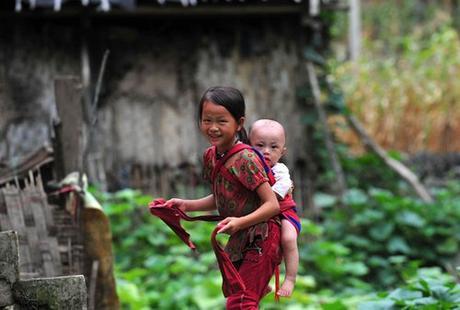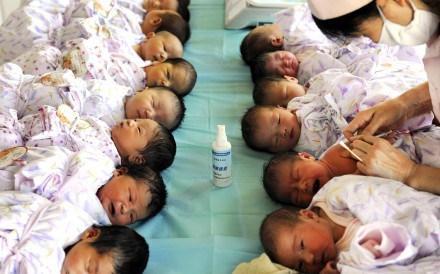Written By Chao Huang & Nicole Webb, Edited by Nicole Webb
One of the first stories about giving birth I heard in China was from Chao.. it was our first meeting, in a cafe that is probably about as westernised as you can get in Xi’an. They serve coffee, no skim milk mind you and toast smothered in honey and cornflakes. But they have cool tunes playing and it’s a great little slice of normality amongst the oriental fray.
Chao is Chinese but one of the most westernised Chinese people I’ve yet to meet. She’s married to a Dutchman, but never lived out of China, so we are constantly impressed with her ability to understand the western way.
So on that first coffee date, she came rushing in, almost six feet tall, long thick dark hair to her waist… again an education for me, given most Chinese I’d met were quite small and at five foot 3, I’m usually on the tall side. (I discovered Chao’s from north, north, north China, up there they breed them tall, they tell me.) We ordered coffees, began introductions and before I knew it, Chao was giving us a blow by blow account of her own birth story in China.
It wasn’t the last story… over the course of our stay in Xi’an, I heard all sorts of “pregnancy” stories – some heartwarming, others that would make your hair stand on end and had me quietly vowing never to have a baby in China.
Stories of there not being enough beds to deliver on, women in the height of labour on trolleys in the corridor. Nurses scolding women during the birth for crying. Having to pay “Guan xi” (extra money) to secure more time with the doctor or a better service. And be sure to BYO food, nappies, cleaning products and most definitely toilet paper!
In many Chinese hospitals, fathers still aren’t allowed in for the birth.
I’ve heard stories of babies suffering jaundice and being kept in hospital for a week with no parental visits allowed.
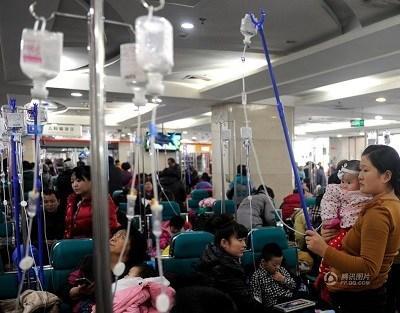
Stories of Chinese doctors scared to treat babies of mixed race.
Stories of China’s quest for the perfect baby (ultimately stemming from the one child policy) and subsequently meaning abortions legally carried out as late as eight months and often encouraged by families and doctors if there is something (often minor) wrong with the baby…(busses all over town still bear big signs advertising abortion clinics).
One particularly memorable story about an American expat who had to ship her own blood in from the U.S because she was A-negative blood type and few Chinese people are. Being in this blood group also had me a little on edge truth be told, should I ever need a transfusion, in China.
And then, of course, the strange (to us) things a pregnant woman can and can’t do during her nine months of pregnancy.
My dear friend Chao is pregnant again… in Xi’an, so I asked her to write a guest post on how things have gone so far, and what it’s really like having a baby in China, today.
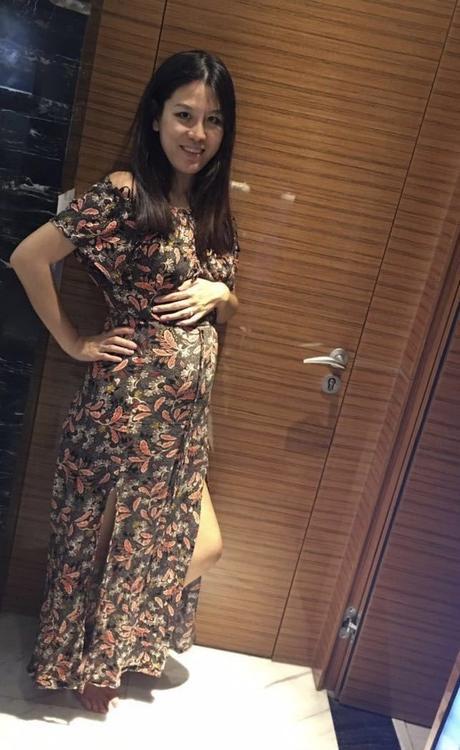
Standing in the busy hospital, bustling with about 100 other pregnant woman, my husband and I were lost in the madness. (Actually, my husband was stunned!) We were in one of the biggest and best women and children’s hospital in China but it was totally overwhelming and knowing where to go was impossible.
I’d only just found out I was pregnant, for the second time.
Of course, as with everything in China, a lot of things have rapidly moved on since my first pregnancy, five years ago.
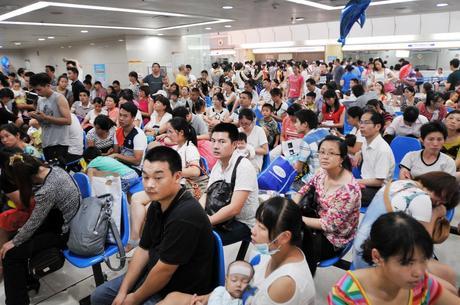
But what struck me immediately, that definitely hasn’t changed, is the chaos! With a population of 1.4 billion and the relaxing of the one child policy, China’s hospitals are only getting more and more crowded. Guest relations are a last resort. Priority is getting through the bevy of patients in need.
When you first enter the hospital, there’s a woman sitting at the main service desk. My simple question,‘ Which floor should I go to?’ was answered with, “It depends if you are 100% sure you are pregnant!” Um…I try to explain, I’ve tested positive twice, but before I could finish, she waved me off with an impatient “Go the third floor!”
We rode the escalator squashed in with a dozen other women and their partners. The doors opened and my eyes bulged — there before me were two giant halls – overflowing with no less than 300 people!! There was a long queue winding out of the hall and down the corridor with women lining up to pay for a heart-beat monitor; another shorter queue with women waiting on two blood-pressure machines, and the rest of the space was filled with pregnant women, their mums, husbands and probably mother-in-laws.
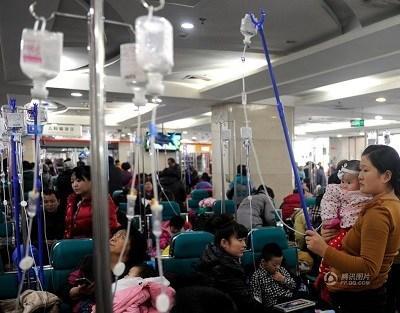
It was utter bedlam.
I tried to gently push through the crowds to get to the counter. Anxious and uncertain, I quietly stammered to the older nurse, “What shall I do when I find out I am pregnant?” She looked at me like I’d asked the silliest question and perhaps I had. She gruffly interrupted with a quick gesture to say, read the procedure on the wall, “You have eyes and are literate right?!” she chided. Side note: Doctors and nurses in public hospitals in China aren’t known for their bedside manner.
I struggled my way through the people leaning against the wall and read that I would need a hospital card with my name on it and enough money deposited on it to move forward in this pregnancy game! How much money is enough? Well that depends on how much trouble you want to go to. You can just deposit 20RMB ($US3) for a doctor’s appointment but then you’ll have to keep running to the machine to deposit for the medicines, blood tests, ultrasounds, etc. And only then can I go online and register to a doctor’s office. (No specific doctor, of course, at this stage.)
The security guards were chasing away any male who was standing in the hall that looked out of place (even though they were the equally nervous fathers-to-be); the nurses were frantically writing down blood pressure figures, and while it seemed like everyone else was sitting quietly, the noise was unbearable.
And that was my first visit to an Obstetrician/Gynaecologist. (There are few general practitioners and almost everything medical is done in one of China’s mammoth hospitals.)
Of course, to my dismay, I had to go back again, especially as it has the best doctors in the province and every one, including me, is desperate for the very best treatment. In second or third tier cities, like Xi’an, despite having a population of nine million, private hospitals with good service don’t attract the top doctors and they lack first class medical equipment.
Of course, it’s natural for any new parents to want the best medical care, but the extremes Chinese people go to during pregnancy to ensure a healthy baby are surely debatable.
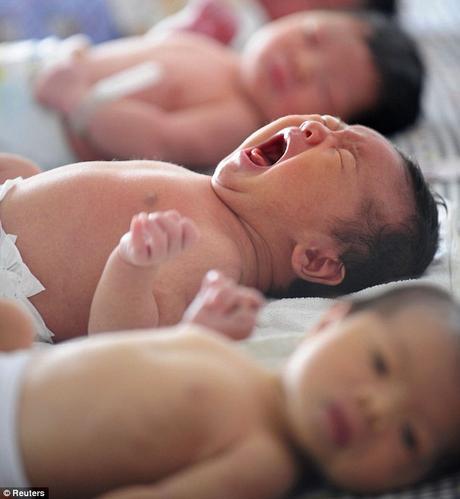
Google “Chinese pregnancy taboos” and you’ll be swamped with a million ‘do’s and don’ts’. A few I have been warned of personally that you might find interesting (or have a chuckle at), but many Chinese take very seriously are: #1 Don’t eat crabs! This can cause a difficult labor and the baby could be born sideways. (Like a crab right!) #2 Eating light-coloured food will make your baby fair-skinned, while soy sauce and coffee will ruin the baby’s skin, making them dark, and in China the fairer the better. #3 Eating a lot of black sesame will make the baby’s hair glossy and shiny like black satin; #4 No eating rabbit meat, as this could cause cleft palate (which is quite a big problem in China..and sadly one many parents can’t afford to fix, resulting in a huge number of orphans.) #5 You should look at pictures of cute babies constantly, that will make your future baby beautiful (I do find this one kind of cute); #6 Food that is too “cold” should be avoided as nobody wants a miscarriage or diarrhoea.
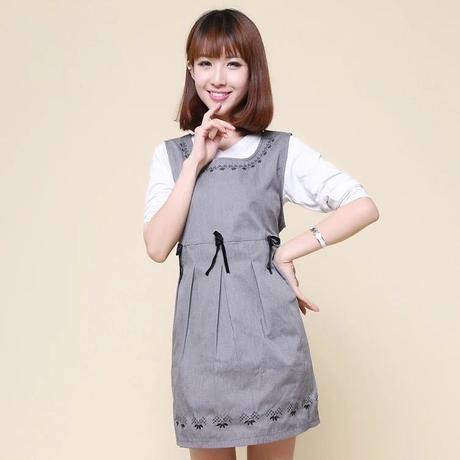
And when I was pregnant five years ago, we were all advised to wear an ‘anti-radiation vest” when sitting in front of a computer or talking on the phone, to block out radiation. When my obstetrician suggested I wear one for the whole pregnancy, I did, but with hindsight, I shouldn’t have, as that thing is thick and heavy and you were not allowed to wash it and I had to wear it for 9 long months!!
So, not surprisingly, China is possibly one of the few places where airport security is willing to shut the radiation screening on the security check for a pregnant woman and agree to check her by hand — and that, is quite sweet.
And did I mention that many Chinese friend’s jaws dropped when they heard I’d be taking multiple planes across continents during my second and early third trimester for travel? Many of them warned me against it, shaking their heads and saying “A friend of a friend’s lost their baby after a domestic flight – the doctor’s explanation — “It might be true, if you haven’t done any other unusual things, because there’s not enough oxygen in the plane.”
I know, generally speaking, pregnancy is not easy, the world over, but here where it’s steeped in tradition, superstition and the (often over bearing but well meaning) advice of elders/friends/or even doctors, it goes to the next level.
And the intensity only continues during postpartum, especially that crucial first month.
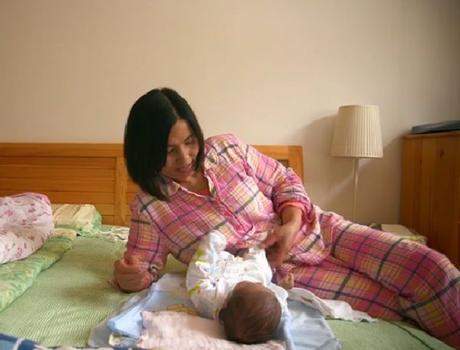
Called “Zuo Yuezi”, it is commonly practiced in urban and rural China, and means the new mums must behave according to traditional beliefs and practices.
It’s believed this will help the new mum regain her strength and protect her health for the future, and includes avoiding cold or salted food; staying inside the house with the doors and windows closed so no wind blows through. (It’s thought the wind will blow into the bones of the new mum and cause arthritis and joint pains!) Avoid housework and limit visitors. And because the body structure has changed during pregnancy and labor, Chinese believe women should lie in bed before all the organs in the body move out of position; and definitely no showering or brushing your teeth for this month!!
I was thinking these old traditions had died down a little, but recently the fairly modern-looking lady next door told me she didn’t get out of her bed unless it was absolutely necessary after giving birth! My eyes widened when she told me she did NOT brush her teeth for a month. But before I could hide my surprise, she said “Yeah, you can be as judgmental as you want, but you will regret it when you have the inside problem in your body when you are older.” Then when I asked how many damaged teeth she had, she shrugged, “Just one cavity, but it was bad and I had to have a crown after the month.”
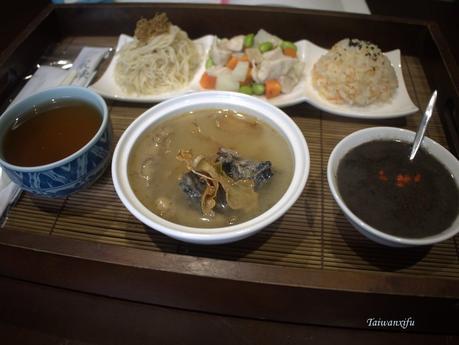
Of course, these old traditions are wise customs from the past, and I do believe, that to some degree, women need enough rest and nutrition after such a major change in their body, and in the past (as little as three decades ago), women were better off following these rules because there was no hot water or heating back, a lot of women were doing hard labor work and were malnutritioned.
But with all the amenities and convenience we have now, surely it needs updating?
I am not the only one to say that. This age old tradition is bringing new business and “YueZi Zhong Xin” is one. Postpartum care centres for new mums in that first month, are springing up all over the place. Charging from 10,000 RMB (about $1600USD) to 200,000 ($30,000 USD) or even more depending on how luxurious it is, they provide in-room dining up to six times a day, help with breastfeeding and breast massaging, and have nurses on hand to check body measurements. New moms can just rest in their hotel-like bedrooms until care givers bring your baby for feeding. (Sounds just like a regular western hospital, doesn’t it?) 😉
And now with more migrants and more rich mums trying to deliver babies in developed countries to get their children a “better” passport, there are more postpartum centres thriving in the popular Chinese residing cities like Los Angeles and Toronto.
In China, we like to quote Hegel’s saying “What is rational is actual and what is actual is rational.” to explain that everything exists for a reason and these deep-rooted traditions won’t die down in the foreseeable future.
After all, everything has its reason.
This is China.
